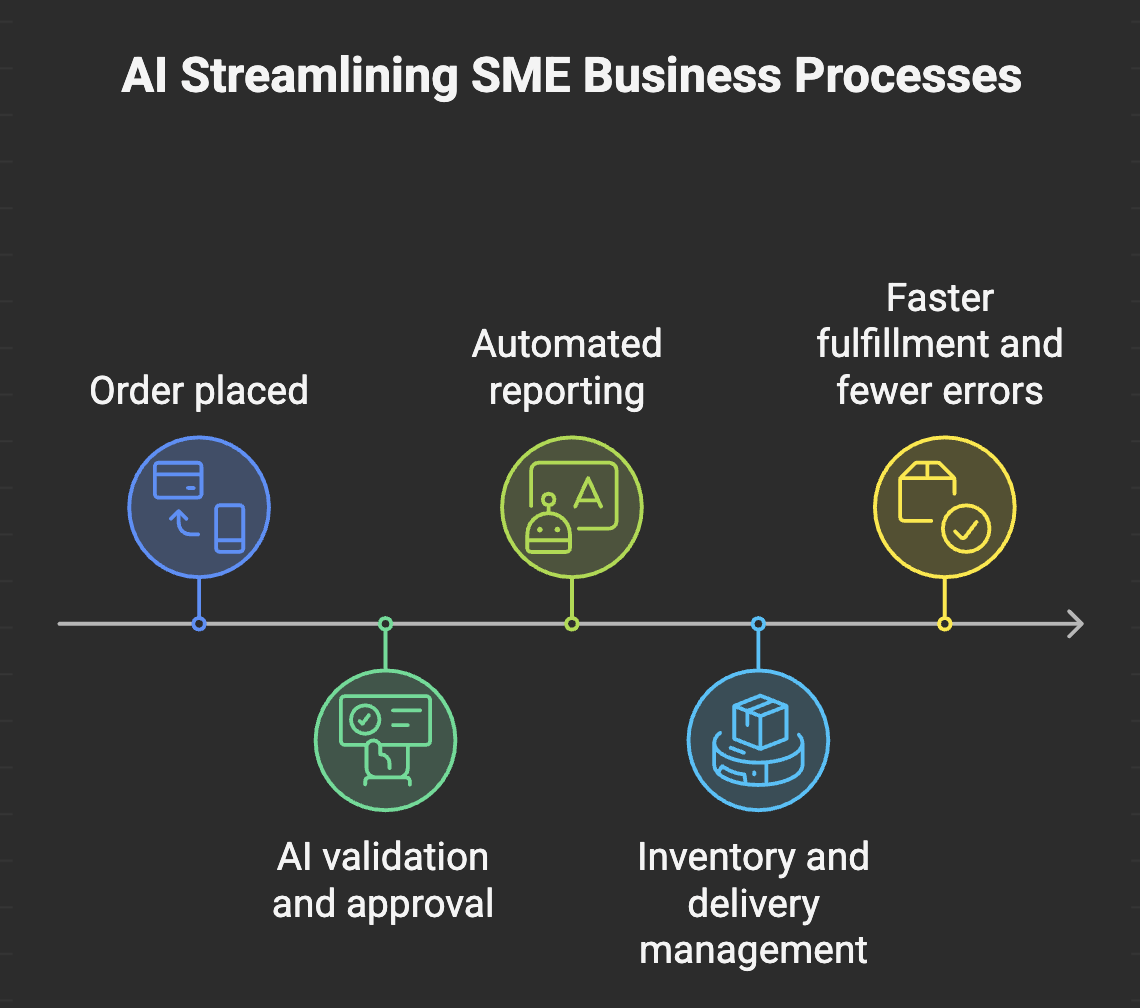Artificial Intelligence is helping level the playing field in 2025 by streamlining complex operations that once required extensive manpower and time.
A recent McKinsey report shows that nearly 70% of businesses are embracing automation, with AI leading the way in boosting efficiency, reducing costs, and supporting better decisions.
These improvements are especially visible when AI agents power SME workflows with real-time decision-making, task handling, and continuous learning capabilities.
Why Process Streamlining Matters for SMEs
For many SMEs, the thought of automating core processes can feel overwhelming. But Business Process Automation is no longer just about reducing workload, it’s about driving measurable value. By automating repetitive and error-prone tasks like invoicing, data entry, and customer follow-ups, SMEs can reduce friction and improve performance across departments.
AI-powered automation reduces manual work, eliminates common errors, and accelerates overall efficiency. With the right tools, businesses can focus on growth instead of daily operational bottlenecks.
If you want a step-by-step approach to integrating automation, check out how AI workflow design helps SMEs optimize operations across departments.
How AI Streamlines SME Business Processes
AI can automate end-to-end workflows, from order intake to validation, reporting, and final delivery. This creates consistent quality, faster turnarounds, and fewer errors. According to Gartner, AI is set to eliminate 80 percent of manual project management tasks by 2030, freeing leaders to focus on innovation rather than administration.

AI Tools Powering SME Operations
Platforms like UiPath and Automation Anywhere are making AI-driven process automation widely accessible.
- UiPath is ideal for beginners with its intuitive design and flexible pricing.
- Automation Anywhere offers more advanced analytics and scalability for SMEs preparing for growth.
These platforms support a range of use cases from data entry and compliance checks to financial reporting and customer service while enabling AI to make intelligent decisions through real-time data analysis.
Explore how these tools are used in drag-and-drop workflow builders to simplify configuration and reduce technical complexity.
Case Study: AP Invoice Automation at a Manufacturing SME
A mid-sized manufacturing SME implemented UiPath to automate its accounts payable (AP) process, as detailed by Iqra Technology. The SME processed hundreds of supplier invoices monthly and faced frequent errors, delayed payments, and resource strain.
Implementation Highlights
- The AP automation workflow used UiPath bots to:
- Extract data from supplier invoices (PDF or scanned)
- Validate invoice metadata against purchase orders
- Enter data into the accounting system automatically
Measurable Results
| KPI | Before Automation | After Automation | Improvement |
|---|---|---|---|
| Invoice processing time | Manual (hours) | 75% faster | Major efficiency |
| AP cost | High | 30% lower | Reduced overhead |
| Invoice errors | Frequent | 90% fewer | Significantly more accurate |
These efficiencies enabled staff to shift focus to supplier relationships and negotiations rather than repetitive data entry. This real-world example perfectly illustrates how even small manufacturers can reap big benefits from AI-powered process automation.
The Financial Upside of Process Automation
AI automation isn’t just about doing things faster, it’s about doing them cheaper and smarter. McKinsey reports that companies using AI can cut operating costs by 20 to 30 percent and boost efficiency by more than 40 percent. Deloitte findings support this, showing a 25 percent improvement in processing time and a 30 percent reduction in compliance costs.
In finance departments, AI is accelerating reporting cycles by automating data entry and reconciliation. One Estonian firm reduced invoice processing costs by 80 percent and cut its monthly closing time from 10 days to 2.
For a decision-making layer on top of automation, SMEs are also exploring decision intelligence platforms to guide when and how to act.
Trends in AI Process Automation for 2025
As AI matures, several trends are shaping how SMEs approach process automation this year:
Intelligent Process Optimization
AI is optimizing complex processes by applying machine learning models to data-heavy workflows.
Predictive Analytics and Decision Intelligence
AI is enabling SMEs to anticipate trends and make proactive decisions by analyzing large volumes of data.
Natural Language Processing in Workflows
NLP tools and generative AI are now integrated into workflow platforms to facilitate smoother communication and automation.
Conclusion
AI-driven automation is becoming the cornerstone of efficient, scalable SME operations. With tools like UiPath and Automation Anywhere, even small businesses can automate processes across departments and refocus efforts on strategic priorities.
Starting small by targeting the most repetitive tasks helps build momentum and confidence for broader implementation. For SMEs ready to grow smartly, AI offers the roadmap.
To learn more about how AI can streamline your business processes and transform your operations, explore our comprehensive reports page for in-depth analysis, case studies, and implementation strategies.
FAQs
What are the benefits of AI process automation for SMEs?
AI automation helps SMEs save time, reduce errors, lower operational costs, and improve decision-making. It allows small teams to focus on high-value work while routine tasks run automatically.
Is AI automation expensive for small businesses?
Not necessarily. Platforms like UiPath and Automation Anywhere offer scalable pricing, making them accessible even for smaller companies. Many SMEs start with a single process to keep costs low and build from there.
What processes should SMEs automate first?
SMEs should begin with repetitive, time-consuming tasks such as invoicing, data entry, customer follow-ups, and reporting. These offer quick wins and measurable impact.
How does AI improve accuracy in business operations?
AI reduces human errors by processing data consistently and verifying information automatically. This is especially helpful in areas like inventory management, accounting, and compliance.
Can AI tools integrate with existing software?
Yes, most modern AI automation tools are designed to integrate with popular business platforms, including CRMs, ERPs, and accounting systems, enabling smooth adoption without full system overhauls.



